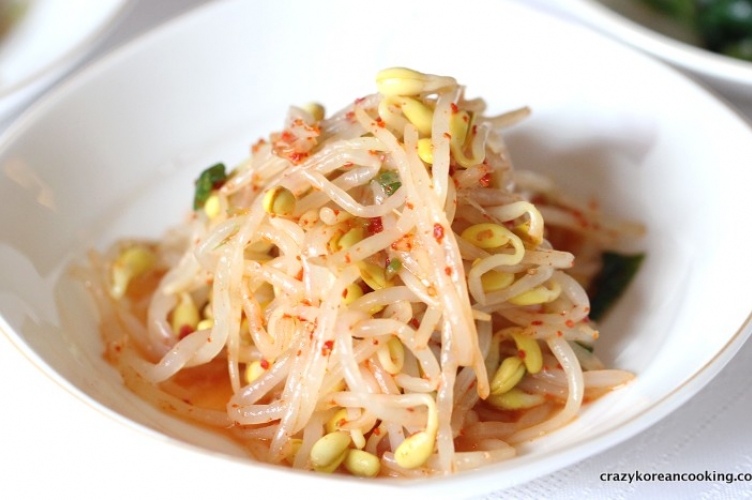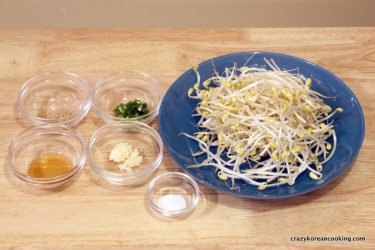Soybean Sprouts Side Dish, Kong Namul Muchim
콩나물 무침

Kong Namul is a traditional vegetable side dish widely enjoyed by Koreans. (Kong means “soybean sprouts." Namul means "vegetable side dish.") It’s great for any meal. It can also be used as a topping on bibimbap. You can make this dish non-spicy or spicy. The spicy version is particularly delicious.
Soybean sprouts are similar to mung bean sprouts, but they are crispier in texture and stronger in taste. The heads of soybean sprouts are larger, firmer and vibrant yellow. The stems are longer and whiter. Soybean sprouts are generally found only in Korean or Asian grocery markets, since most North Americans are more familiar with mung bean sprouts.
Buy Korean ingredients online here.
Kong Namul is a traditional vegetable side dish widely enjoyed by Koreans. (Kong means “soybean sprouts." Namul means "vegetable side dish.") It’s great for any meal. It can also be used as a topping on bibimbap. You can make this dish non-spicy or spicy. The spicy version is particularly delicious.
Soybean sprouts are similar to mung bean sprouts, but they are crispier in texture and stronger in taste. The heads of soybean sprouts are larger, firmer and vibrant yellow. The stems are longer and whiter. Soybean sprouts are generally found only in Korean or Asian grocery markets, since most North Americans are more familiar with mung bean sprouts.
Buy Korean ingredients online here.
INGREDIENTS
shop these ingredients online »for blanching soybean sprouts | ||
| 11 oz | Soybean Sprouts 콩나물 | |
| ⅔ tsp | Salt 소금 | |
| 6 cups | Water 물 | |
for seasoning | ||
| ⅔ tsp | Salt 소금 | |
| 1½ tsp | Sesame Oil 참기름 | |
| 1½ tsp | Garlic (minced) 다진 마늘 | |
| 23 | Green Onion 파 | |
| 1½ tsp | Sesame Seeds 깨 (optional) | |
for spicy version only | ||
| 1 tbs | Gochugaru, Korean Hot Pepper Flakes 고춧가루 (optional) | |

Optional Ingredients and Substitutions
Gochugaru (red chili flakes): Add some gochugaru (red chili flakes) to make a spicy variation.
More questions? Please leave your questions below in the comments section. We will do our best to answer as soon as we can.
instructions |
photos |
summary |
|---|---|---|
Ingredient amounts in the recipe instructions are for the default serving size. |
Click to enlarge photos. |
Ingredient amounts in the recipe summary are for the default serving size. |
1. WashWash 200g of soy bean sprouts thoroughly in cold water two or three times. Remove any bad beans or spoiled (brown colored) roots if any. Some people remove all roots but it’s not necessary. |
1
Wash thoroughly
Remove bad beans & roots | |
2. BlanchBoil 4 cups of water on high heat. Add ½ tsp of salt and blanch soy bean sprouts win boiling water on high heat for 3-5 min or until the bean sprouts die down. Make sure the lid is on while boiling. If boiled uncovered, it can result in a mild but unpleasant smell on the sprouts. Do not over cook. |
2
Boil 4 cups water High Heat Add ½ tsp salt Blanch bean sprouts in boiling water High Heat | |
3. RinseDrain water in a strainer for about 5 min. |
3
Drain water | |
4. SeasonMix soy bean sprouts with ½ teaspoon of salt, 1 teaspoon of sesame oil, 1 teaspoon of minced garlic, 1 tablespoon of chopped green onion and ½ teaspoon of sesame seeds. Mix everything thoroughly by hand. |
4
Season
Mix well | |
5. ServeServe on a side dish plate. You can sprinkle more sesame seeds on top as a garnish if you like. Enjoy! |
5
Serve | |
6. Make spicy variationAdd 2 teaspoons of gochugaru (red chili flakes) to the seasoning for a spicy version. |
6
Enjoy! |













 3 min
3 min